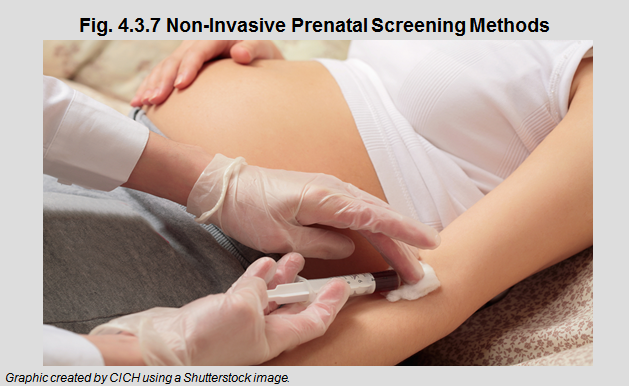Non-Invasive Prenatal Screening Methods

Following screening, genetic testing can occur during pregnancy for Down syndrome, Trisomy 18, and other conditions. Two major types of genetic testing are available: amniocentesis and chorionic villus sampling; however, these tests can increase the risk of miscarriage.
New non-invasive prenatal screening can now be conducted on a mother’s blood samples. These tests analyze trace amounts of the baby’s genetic information (DNA) that is present in the mother’s blood. These tests are more reliable than the other tests, have a higher detection rate (e.g., 99% for Down syndrome), and can be carried out early in pregnancy (after 10 weeks).
The use of non-invasive prenatal screening varies from province to province. It is available privately (paid for by the patient) in British Columbia,1 Manitoba, and Ontario2 as an alternative to amniocentesis. Patients in Quebec can access these tests through private labs.
The Society of Obstetricians and Gynaecologists of Canada recommends using appropriate guidelines when offering prenatal non-invasive screening. The Society recommends that this type of screening should be an option after a positive result from currently used serum and ultrasound screening techniques for women wishing to avoid invasive testing. Early identification of a positive result may improve treatment and prognosis. The Society states that further studies are needed to determine if this method can be used reliably as a first screening approach in average-risk pregnancies.3
Implications
Non-invasive prenatal screening technology requires further research. Genome Canada, Dr. François Rousseau at Université Laval, and Sylvie Langlois at University of British Columbia are among the leading interprofessional researchers based in eight Canadian universities and five European universities. They will compare different genetic technologies for their effectiveness in successfully detecting genetic conditions using the mother’s blood.4
Non-invasive prenatal screening is currently not insured in Canada; however, it is available privately to those people who have the means to pay.
The decisions that families face regarding genetic screening are complex. If a fetus could inherit a serious health problem, the decisions facing the mother and family can be difficult. Access to appropriate counselling and support during these times is essential. To help women and families understand the implications, informed consent is an important component of the medical decision process.
1BC Prenatal Genetic Screening Program, http://www.perinatalservicesbc.ca/ScreeningPrograms/PrenatalGeneticScreening/healthcare-providers/NonInvasivePrenatalTesting/default.htm
2Prenatal Screening Ontario. For Parents: Non-invasive Prenatal Testing (NIPT) Factsheet. 2012. http://www.mountsinai.on.ca/care/pdmg/NIPT%20info%20sheet%20for%20parents%2029_11_2012.pdf
3Langlois S, Brock J. Current status in non-invasive prenatal detection of down syndrome, trisomy 18, and trisomy 13 using cell-free DNA in maternal plasma. SOGC Committee Opinion No. 287, February 2013. J Obstet Gynaecol Can. 2013;35(2):177–81
4 Rousseau F, Langlois S. Personalized genomics for prenatal aneuploidy screening using maternal blood (Pegasus). GénomeQuébec Inc. http://www.genomequebec.com/156-en/project/personalized-genomics-for-prenatal-aneuploidy-screening-using-maternal-blood-pegasus-.html
